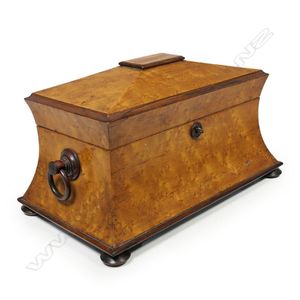Victorian Burr Maple Sewing Box with Lift-Out Compartment
A Victorian burr maple sewing box, sarcophagus form with turned wood captured ring handle to each side, the interior with lift out compartment, raised on squat bun feet. 40 x 24 x 23 cm.
You must be a subscriber, and be logged in to view price and dealer details.
Subscribe Now to view actual auction price for this item
When you subscribe, you have the option of setting the currency in which to display prices to $Au, $US, $NZ or Stg.
This item has been sold, and the description, image and price are for reference purposes only.
- Maple - Maple, native to North America, is a dense heavy timber from light to yellow-brown in colour. It has very little distincive graining unless it is one of the variants such as birds-eye maple or burr maple, so was not used extensively for furniture in 18th and 19th century, where cabinetmakers and designers preferred timbers with more distinctive features such as mahogany, walnut, rosewood and oak.
Birds-eye maple has a seres of small spots linked by undulating lines in the grain, is highly sough and is used as a decorative veneer. Burr maple has larger and irregular grain swirls than birds-eye maple. - Burr - Burr (or in the USA, burl) is the timber from the knotted roots or deformed branch of the tree, which when cut, displays the small circular knots in various gradations of colour. It is always cut into a decorative veneer, most commonly seen as burr walnut on 19th century furniture.
- Victorian Period - The Victorian period of furniture and decorative arts design covers the reign of Queen Victoria from 1837 to 1901. There was not one dominant style of furniture in the Victorian period. Designers used and modified many historical styles such as Gothic, Tudor, Elizabethan, English Rococo, Neoclassical and others, although use of some styles, such as English Rococo and Gothic tended to dominate the furniture manufacture of the period.
The Victorian period was preceded by the Regency and William IV periods, and followed by the Edwardian period, named for Edward VII (1841 ? 1910) who was King of the United Kingdom and the British Dominions and Emperor of India for the brief period from 1901 until his death in 1910.
This item has been included into following indexes:
